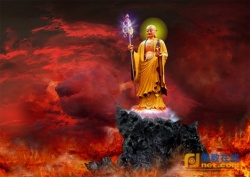Difference between revisions of "དྲི་ཟ་"
Jump to navigation
Jump to search
(Created page with "{{DisplayImages|{{Random number}}}} {{Dictkey|དྲི་ཟ།}} (Wyl. ''dri za'') ''n.'' {{Color|#808080|''Pron.:'' driza}} * ''Skt.'' gandharva. * ''Skt.'...") |
m (Text replacement - "{{Dictkey|" to "{{BigTibetan|") |
||
| Line 1: | Line 1: | ||
{{DisplayImages|{{Random number}}}} | {{DisplayImages|{{Random number}}}} | ||
| − | {{ | + | {{BigTibetan|[[དྲི་ཟ]]།}} ([[Wyl.]] ''[[dri za]]'') ''n.'' {{Color|#808080|''Pron.:'' driza}} |
* ''Skt.'' [[gandharva]]. | * ''Skt.'' [[gandharva]]. | ||
* ''Skt.'' {{SanskritBig|[[गन्धर्वः]]}}, [[gandharva]], {{Color|#006060|''Pron.:'' gandharva}}. From {{Color|#006060|''Sanskrit:''}} a [[Gandharva]] [though in later times the [[Gandharvas]] are regarded as a class, yet in | rarely more than one is mentioned | he is designated as the heavenly [[Gandharva]] | and is also called Viśvā-vasu | in | his habitation is the sky, or the region of the air and the heavenly waters | his especial duty is to guard the heavenly Soma | which the gods obtain through his intervention | it is obtained for the human race by Indra, who conquers the [[Gandharva]] and takes it by force | the heavenly [[Gandharva]] is supposed to be a good physician, because the Soma is considered as the best medicine | possibly, however, the word Soma originally denoted not the beverage so called, but the moon, and the heavenly [[Gandharva]] may have been the genius or tutelary deity of the moon | in one passage | the heavenly [[Gandharva]] and the Soma are identified | he is also regarded as one of the genii who regulate the course of the Sun's horses (i, 163, 2 ; x, 177, 2 | N. of the attendant of the 17th [[Arhat]] of the present Avasarpiṇī | a singer | the Koi0l or black cuckoo | a sage, pious man | on | a horse | the musk deer | derived fr. | the soul after death and previous to its being born again (corresponding in some respects to the western notion of a ghost) | N. of the 14th Kalpa or period of the world | of the 21st Muhūrta | of a Svara or tone | for | the Gandharvas | above | N. of a people (named together with the Gāndhāras) | * ''Skt.'' {{SanskritBig|[[गन्धर्वः]]}}, [[gandharva]], {{Color|#006060|''Pron.:'' gandharva}}. From {{Color|#006060|''Sanskrit:''}} a [[Gandharva]] [though in later times the [[Gandharvas]] are regarded as a class, yet in | rarely more than one is mentioned | he is designated as the heavenly [[Gandharva]] | and is also called Viśvā-vasu | in | his habitation is the sky, or the region of the air and the heavenly waters | his especial duty is to guard the heavenly Soma | which the gods obtain through his intervention | it is obtained for the human race by Indra, who conquers the [[Gandharva]] and takes it by force | the heavenly [[Gandharva]] is supposed to be a good physician, because the Soma is considered as the best medicine | possibly, however, the word Soma originally denoted not the beverage so called, but the moon, and the heavenly [[Gandharva]] may have been the genius or tutelary deity of the moon | in one passage | the heavenly [[Gandharva]] and the Soma are identified | he is also regarded as one of the genii who regulate the course of the Sun's horses (i, 163, 2 ; x, 177, 2 | N. of the attendant of the 17th [[Arhat]] of the present Avasarpiṇī | a singer | the Koi0l or black cuckoo | a sage, pious man | on | a horse | the musk deer | derived fr. | the soul after death and previous to its being born again (corresponding in some respects to the western notion of a ghost) | N. of the 14th Kalpa or period of the world | of the 21st Muhūrta | of a Svara or tone | for | the Gandharvas | above | N. of a people (named together with the Gāndhāras) | ||
Latest revision as of 06:12, 21 November 2015
དྲི་ཟ། (Wyl. dri za) n. Pron.: driza
- Skt. gandharva.
- Skt. गन्धर्वः, gandharva, Pron.: gandharva. From Sanskrit: a Gandharva [though in later times the Gandharvas are regarded as a class, yet in | rarely more than one is mentioned | he is designated as the heavenly Gandharva | and is also called Viśvā-vasu | in | his habitation is the sky, or the region of the air and the heavenly waters | his especial duty is to guard the heavenly Soma | which the gods obtain through his intervention | it is obtained for the human race by Indra, who conquers the Gandharva and takes it by force | the heavenly Gandharva is supposed to be a good physician, because the Soma is considered as the best medicine | possibly, however, the word Soma originally denoted not the beverage so called, but the moon, and the heavenly Gandharva may have been the genius or tutelary deity of the moon | in one passage | the heavenly Gandharva and the Soma are identified | he is also regarded as one of the genii who regulate the course of the Sun's horses (i, 163, 2 ; x, 177, 2 | N. of the attendant of the 17th Arhat of the present Avasarpiṇī | a singer | the Koi0l or black cuckoo | a sage, pious man | on | a horse | the musk deer | derived fr. | the soul after death and previous to its being born again (corresponding in some respects to the western notion of a ghost) | N. of the 14th Kalpa or period of the world | of the 21st Muhūrta | of a Svara or tone | for | the Gandharvas | above | N. of a people (named together with the Gāndhāras)
